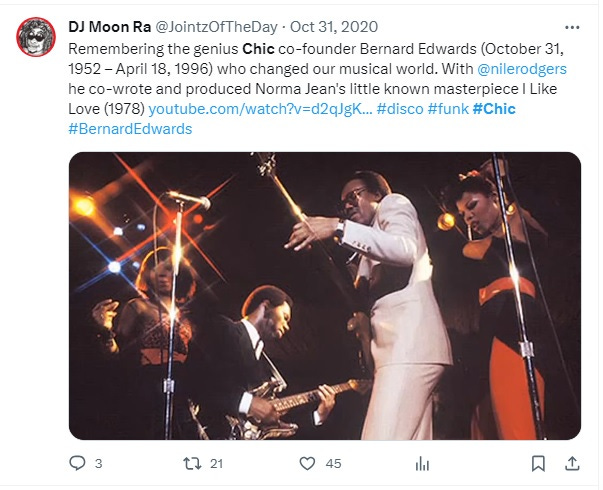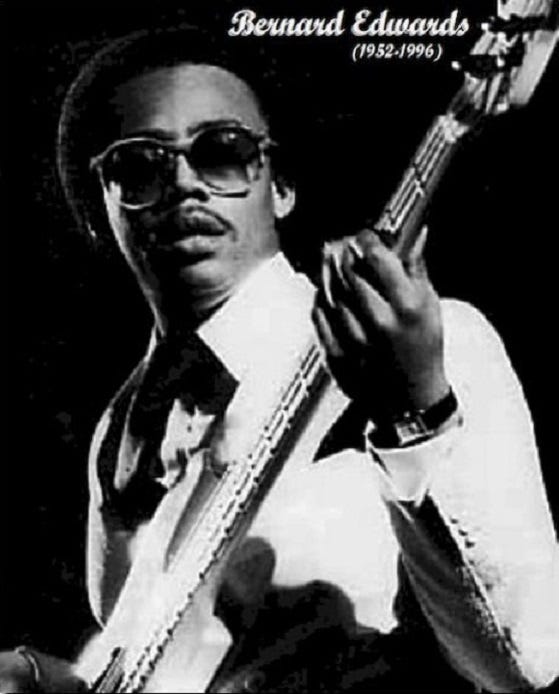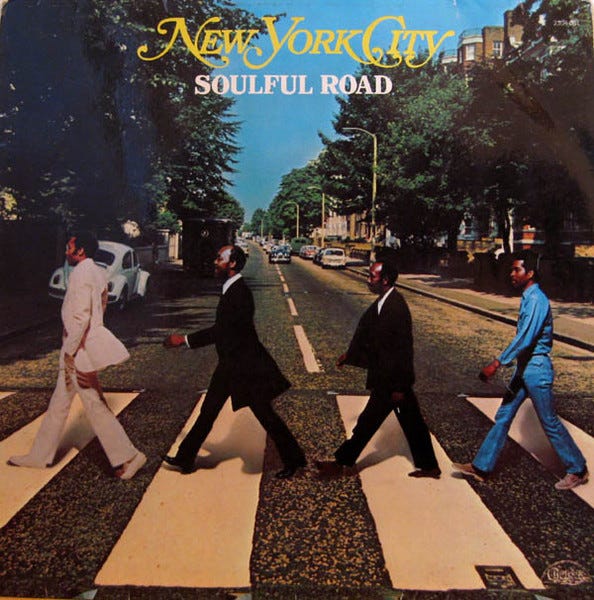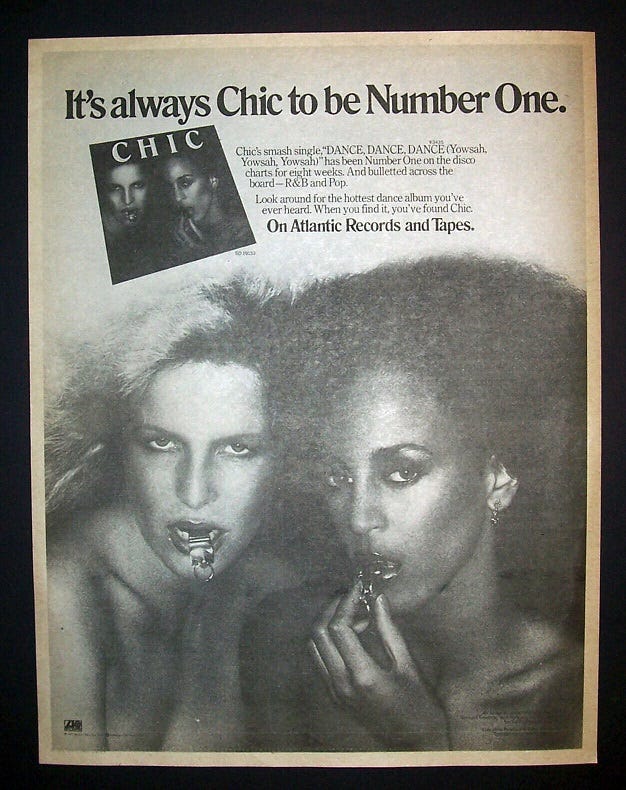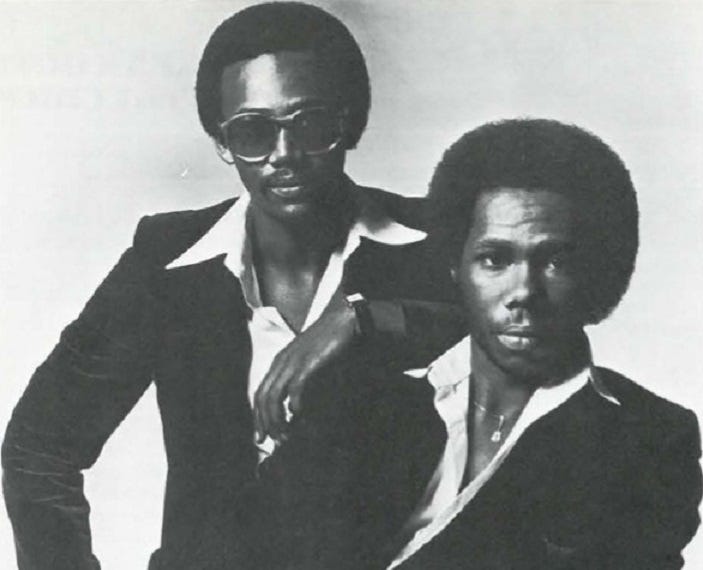Bernard Edwards (October 31, 1952 – April 18, 1996) – I Like Love (1978)
The Chic co-founder and musical genius co-wrote and produced this dancefloor masterpiece for Chic lead singer Norma Jean Wright's debut solo album.
Watch full video on Twitter.
View most updated version of this post on Substack.
The great bassist, songwriter and producer Bernard Edwards was the co-founder of the hugely successful disco group Chic. Together with his musical partner Nile Rodgers, he co-wrote and produced massive hits for Chic and others including Diana Ross and Sister Sledge that ruled the airwaves in the late 1970s.
Edwards was born in Greenville, North Carolina, but raised in Brooklyn. He met Rodgers while working at the post office with the mother of Rodgers’ then-girlfriend. “We spoke on the phone at that time,” explained Rodgers in a 1978 interview, “which must have been about 1969/1970 — but we were really into different things then.”
“I had this jazz-fusion kind of group, with violins, a whole lot of stuff and Bernard was into that funky, R&B trip. We just never got it together then but a few months later, as luck would have it, we just happened to be at the same gig and we immediately dug each other’s playing — I really thought Bernard was a good bass player. Well, of course, when we were introduced he remembered that we’d spoken on the phone — and here we were digging each other’s music, even though we’d initially felt we were musically incompatible!”
In 1972 they joined the Big Apple Band, the backing band for the vocal group New York City. One of their first gigs with them was at the Playboy Club in London.
They toured extensively with New York City, and opened some shows on the first leg of the Jackson 5’s world tour in 1973, substituting for regular opening act the O’Jays whenever they had a headlining gig somewhere else. On that tour, one night Rodgers was upstaged by a guitarist with one of the local acts appearing before them on the lineup, who was playing a Fender Stratocaster. As Rodgers recalled in a 2020 interview:
“Bernard…he gave me the dirtiest look...if looks could kill, I would be dead years ago and I would not be talking to you. Because all along Bernard kept telling me, ‘Buy a Strat, buy a Strat...it’ll change our whole sound, it’s going be so funky. The way you play jazz, if you do that on a Strat, man, you’re going to be killing, you’re going to be known for something.’”
Rodgers went out the next day and bought a Stratocaster for $149, the guitar he now calls the Hitmaker because he has played it ever since and used it to compose all of his and Edwards’ best-known songs.
On New York City’s second and final album Soulful Road (1974), Edwards and Rodgers played on the beautiful, hopeful jam “Take My Hand,” which was produced by Thom Bell and co-written by Philly songwriters Phil Terry, Talmadge Conway, and the great Theodore Life aka T Life.
After New York City split up, Rodgers and Edwards continued on with the Big Apple Band. They hired Tony Thompson as their drummer, who had been playing with Labelle before they disbanded in 1976. In early 1977, the met singer Norma Jean Wright when she moved to NYC and invited her to join the group. They changed their name to Chic after Walter Murphy went to #1 on the Billboard Hot 100 in 1976 with his classical-disco hit “A Fifth Of Beethoven.” It was credited to Walter Murphy and The Big Apple Band by his label, Private Stock Records, not realizing there was already a real band with that name. According to Rodgers:
“We came up with “Chic” because, firstly, we wanted a one syllable name — because that always has impact. We wanted it to convey the idea of having a good time without being frivolous or just campy. We wanted that certain elegance and we wanted to stress that we were qualified as musicians, even though we approached our music light-heartedly, because we feel it’s important that people really enjoy our music as much as we do.”
Chic recorded their first five tracks during a session Rodgers later revealed only cost the group $10, which went towards bribing an engineer not to tell the studio’s manager they were recording there. The tracks featured a then-unknown Luther Vandross on backing vocals. They got a record deal thanks to Atlanta-based R&B artist Everett “Blood” Hollins, who they had done studio work with. “Blood heard what we were doing and dug it,” said Rodgers in 1978, “and recommended us to (his manager) Tom (Cossie) — and he immediately took the tapes to Jerry Greenberg at Atlantic — and we got our deal!”
Their self-titled debut album took six months to be released, and in the meantime copies were being bootlegged and sold. Its advance single “Dance, Dance, Dance (Yowsah, Yowsah, Yowsah)” got a boost after Cossie (who also worked for Buddah Records) gave an acetate of the unreleased track in the summer of 1977 to Boston disco DJ and Nightfall magazine publisher John Luongo. As he recalled years later:
“Once I heard the track, I made tape copies of the acetate they had given me for all the DJs in Boston. The next week, when the national charts came out, all of sudden the acetate that had been given (to me) to see if I thought the record was good came on as Boston Number One! Everybody was blown away because it only said it was an acetate – it didn’t say it was on a label because it was in-between two labels at the time (Buddah and Atlantic) which created a bidding war….(then) it went through the roof when it was released!
When the single finally came out on September 30, 1977, initially on Buddah, then soon after on Atlantic, it became a #1 disco hit and peaked at #6 on both the R&B and Hot 100 charts. The album Chic was released on November 22, 1977, and hit #12 R&B and #27 on the Billboard 200 on its way to going gold.
Immediately after Chic’s debut album was released, lead singer Norma Jean Wright left to pursue a solo career. Rodgers and Edwards produced her first and only studio album, which came out in July, 1978. It was full of stellar tracks, including the #15 R&B classic “Saturday,” the epic disco jam “Sorcerer,” and the album’s highlight, the flawless dancefloor masterpiece “I Like Love.”
Chic’s second single “Everybody Dance” was released in April, 1978 and again hit #1 on the disco charts, although it only reached #12 R&B and #38 on the Hot 100. Their third single did much better, topping all three charts that October. “Le Freak” was the group’s biggest hit, spending seven weeks at #1 in the discos and selling seven million copies. It was the lead single from their second album C’est Chic, which came out in August, 1978 and went platinum, ending up at #1 R&B and #4 on the Billboard 200.
Rodgers and Edwards famously wrote and recorded “Le Freak” in the early morning hours of January 1, 1978 after being denied entry to Studio 54 on New Year’s Eve, even though they had been invited there by Grace Jones and their first album was already a huge disco hit. The song’s refrain was originally “F*ck Off!” instead of “Freak Out!,” which was changed because they realized the song would otherwise be banned from radio.
C’est Chic also featured the majestic disco hit “I Want Your Love” (#1 Disco, #5 R&B, #7 Hot 100) and the superb disco-funk cut “Happy Man,” one of the few tracks they released with Edwards on lead vocals.
In a January, 1979 interview with the influential UK music magazine New Musical Express, Edwards shared his thoughts on why Chic had exploded so fast:
“Both Nile and I are jazz musicians and both have studied classical music too. I spent years with all this heavy stuff, until things clear and you realise that a lot of what you're doing is just the same old ego-tripping. Look, have whatever in your collection at home, but everybody needs a little Friday night. And really that is Chic. No big deal. Y'know, smile, dance, get crazy...we sure do while we're making it, because music is our leeezshure, it's my fun.”
Rodgers and Edwards were in high demand following the worldwide success of C’est Chic. In 1979, they wrote and produced Sister Sledge’s third studio album and all-time biggest selling record, We Are Family. Its title track was released in April, 1979 and went to #1 R&B and on the disco charts, peaking at #2 on the Hot 100. It featured Kathy Sledge on lead vocals, who also sang lead on the hit single “He’s The Greatest Dancer” (#1 Disco and R&B, #9 Hot 100). Her sister Joni was featured on the hypnotic dancefloor anthem “Lost In Music” (#2 UK Dance, #35 R&B). Rodgers has said he considers We Are Family to have been their best overall production, and the LP went to #1 on the R&B album charts and #3 on the Billboard 200.
Risqué (1979) was Chic’s third studio LP and another platinum-selling record for the group, released on July 30, 1979. Its lead single, the iconic “Good Times” topped all three charts that June, and “My Forbidden Lover” made it to #3 on disco charts, #33 R&B and #43 on the Hot 100 that September. The latter single’s disappointing chart performance was an early warning sign of the racist, homophobic anti-disco backlash that was gathering strength in the U.S. that summer.
In 1980, Rodgers and Edwards produced four albums. The most commercially successful was Diana Ross’ iconic LP diana, released that May. It blew up with the hit singles “Upside Down” (#1 on all three charts) and the song they wrote specifically as a gay liberation anthem, “I’m Coming Out” (#1 Disco, #5 Hot 100, #6 R&B). The album went platinum, eventually selling more than 10 million copies and remains Ross’ best-selling studio LP of all time.
They wrote and produced Sister Sledge’s fourth studio album Love Somebody Today, released on March 16, 1980, which featured the superb jams “Got To Love Somebody” (#6 R&B), and “Reach Your Peak” (#21 R&B), with Joni on lead vocals and a blazing sax solo by Rodgers’ neighbor, the disco producer and multi-instrumentalist Meco Menardo.
Chic’s fourth studio album Real People was released June 30, 1980. It led with the funky, new wave-flavored single “Rebels Are We,” which peaked at #8 R&B and #61 on the Hot 100. The LP’s stellar, string-driven instrumental cut “Open Up” was on the B-side. Showcasing the Chic Strings, made up of Valerie Heywood, Cheryl Hong, and Karen Milne, conducted by Gene Orloff, the track remains one of their overlooked gems.
The last album project they helmed that year was an LP for the French group Sheila and B. Devotion, aka Sheila B. Devotion, aka Sheila and the Black Devotion. King Of The World (1980) would prove to be that group’s final album, although it was a hit in Europe and sold more than five million copies worldwide.
Its masterpiece was the sci-fi themed space disco jam “Spacer.” Released as the LP’s advance single in late 1979, it went to #9 on the German charts and #18 in the UK in early 1980. New Musical Express named it the #8 Track of the Year for 1979.
Rest in Power, Bernard Edwards.
Further info:
“Chic: ‘C’est Chic’,” interview with Nile Rodgers by David Nathan, SoulMusic.com, June 1978.
“Chic: 'Everybody needs a little Friday night' – a classic interview from the vaults,” 1979 New Musical Express interview with Bernard Edwards by Danny Baker, The Guardian, July 24, 2012.
“Bernard Edwards, 43, Musician In Disco Band and Pop Producer,” obituary, The New York Times, April 22, 1996.
“Bass Players To Know: Bernard Edwards,” No Treble, June 14, 2018.
“‘Bernard Edwards gave me the dirtiest look...’ Nile Rodgers talks Strats with us,” interview by Jamie Dickson, MusicRadar.com, October 16, 2020.
#disco #soul #funk #Chic #NileRodgers #BernardEdwards


